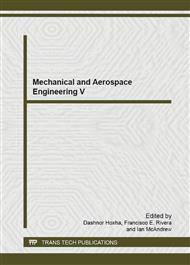[1]
Daniel W. Kwon, Matt Cheplak, Applications of Fractionated Spacecraft Architectures, AIAA SPACE 2011 Conference &Exposition, Long Beach, California, pp.3-8, September (2011).
DOI: 10.2514/6.2011-7131
Google Scholar
[2]
Hu M, Zeng G, Developments of the Fractionated Spacecraft, Journal of the Academy of Equipment Command &Technology, vol. 22, no. 4, pp.61-66, August (2011).
Google Scholar
[3]
Liu H, Liang W, Development of DARPA's F6 Program, Spacecraft Engineering, vol. 19, no. 2, pp.92-96, March (2010).
Google Scholar
[4]
Ma G, Mei J, Adaptive Cooperative Control for Relative Orbits of Multi-satellite Systems, Control Theory &Applications, vol. 28, no. 6, pp.781-786, June (2011).
Google Scholar
[5]
Gang C, Frank L, Distributed Adaptive Tracking Control for Synchronization of Unknown Networked Lagrangian Systems, IEEE Transactions on Systems, Man, and Cybernetics, vol. 41, no. 3, pp.805-816, June (2011).
DOI: 10.1109/tsmcb.2010.2095497
Google Scholar
[6]
Wei R, Distributed Cooperative Attitude Synchronization and Tracking for Multiple Rigid Bodies, IEEE Transactions on Control Systems Technology, vol. 18, no. 2, pp.383-391, March (2010).
DOI: 10.1109/tcst.2009.2016428
Google Scholar
[7]
Qin J H, Yu C B, Leaderless Consensus Control of Dynamical Agents Under Directed Interaction Topology, IEEE Conference on Decision and Control and European Control Conference, Orlando, USA, pp.1455-1456, December 12-15, (2011).
DOI: 10.1109/cdc.2011.6161492
Google Scholar
[8]
Alejandro D., Christoforos N, Distributed Strategies for Average Consensus in Directed Graphs, IEEE Conference on Decision and Control and European Control Conference, Orlando, USA, pp.2124-2129, December 12-15, (2011).
DOI: 10.1109/cdc.2011.6160462
Google Scholar
[9]
Wei R, Randal W, A Survey of Consensus Problems in Multi-agent Coordination, American Control Conference, Portland, USA, pp.1860-1863, June (2005).
Google Scholar
[10]
Nathan S, Wei R, A Unified Formation Control Scheme with a Single or Multiple Leaders, Proceedings of the 2007 American Control Conference, New York, USA, pp.5412-5417, July (2007).
Google Scholar
[11]
Wei R, Randal W, Information Consensus in Multivehicle Cooperative Control, IEEE Control Systems Magazine, pp.71-79, April (2007).
Google Scholar
[12]
Reza O, Richard M, Consensus Problems in Networks of Agents with Switching Topology and Time-Delays, IEEE Transactions on Automatic Control, vol. 49, no. 9, pp.1520-1532, September (2004).
DOI: 10.1109/tac.2004.834113
Google Scholar
[13]
Hong, Vikram, Adaptive Learning Control-Based Periodic Trajectory Tracking for Spacecraft Formations, Proceedings of the 42nd IEEE Conference on Decision and Control, Hawaii, USA, pp.3597-3600, December (2003).
DOI: 10.1109/cdc.2003.1271706
Google Scholar
[14]
Lin L X, Formation Flying of Small Satellite and It's Orbital Configuration, Chinese Space Science and Technology, vol. 1, pp.23-26.
Google Scholar
[15]
Desoer C A, Vidyasagar M, Feedback Systems: input-output properties, New York: Academic Press, (1975).
Google Scholar


